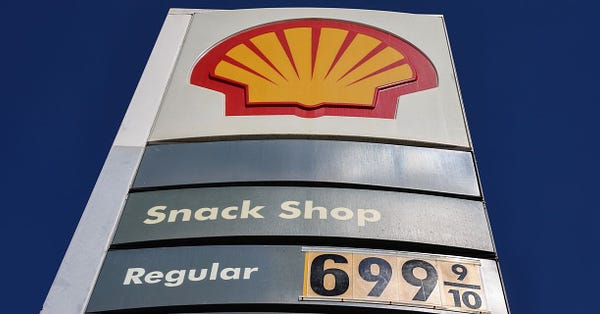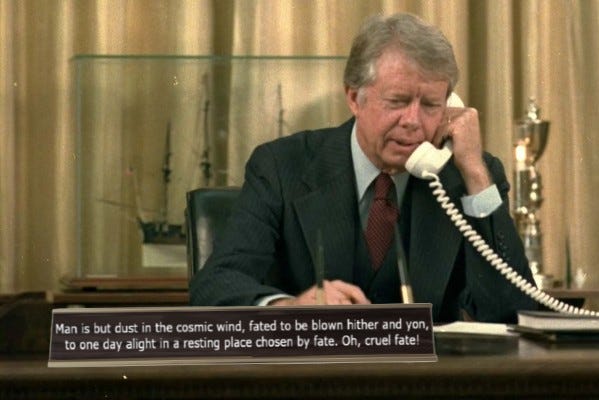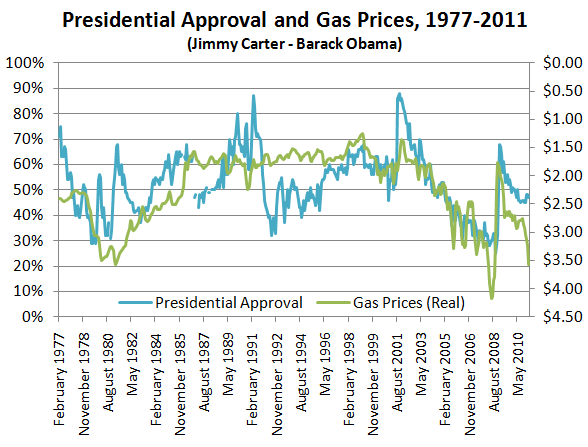The American People Are Old Enough to Know Where Gas Prices Come From
Time to stop with the silly stories
I have a vague memory of being five years old and asking my mom: “Where do gas prices come from?” Mom fidgeted and stared at her hands. Finally, she said “Gas prices come from the Gas Stork! He flies across the land and sets them every morning.” I knew she was lying: A neighbor had already told me that gas prices are grown in a cabbage patch when a Saudi sheik buries a magic oil seed on a full moon. So, I persisted: “Then why didn’t President Carter get the Gas Stork to lower prices and boost his sagging presidency?” I asked. This time, Mom answered right away: “Because Jimmy Carter was a traitor and a fraud and is rightly considered history’s greatest monster.”
Virtually every culture has a myth about the origin of gas prices. The Mayans believed that Gucumatz the feathered spirit made a barrel of crude out of clay, breathed life into it, and sold it for fifty bucks. Hindu lore tells of Purusha, a being who had a thousand heads, eyes, and feet, and also a Chevy Tahoe that he would fill for $3 a gallon. Ancient Egyptians believed that the sun god Ra appeared from a lotus flower and — using one of those really long poles you use to set the reader board at a gas station — fixed the price of gas at $2.59 and 9/10. Though these views of how gas prices came to be are not my own, I appreciate them for what they tell us about human society and our efforts to understand the world.
But the one myth I really can’t abide is that the president sets the price of gas. To hear some people talk, you’d think that there’s a button on the Resolute Desk labeled “lower gas prices.” When you recall that Trump had a special “bring me a Diet Coke” button on the desk, that would make the desk look something like this:
For decades, American politicians have indulged this obvious nonsense for cynical reasons. It’s distorted our politics and led to bad decisions; it’s currently influencing our decision-making on Russia. I think it’s time to put this particular myth to bed.
Most Americans know that the president doesn’t set gas prices. We understand that markets for crude oil are global, and though the president and Congress have some influence over supply and demand — especially domestically — they’re only two players in a large, global game. Of course, our leaders don’t often trumpet this fact; presidents, especially, don’t like to yell “I’m feckless!” from a mountaintop. There’s a reason why Harry Truman put a sign on his desk that said “the buck stops here”, and not one that said “man is but dust in the cosmic wind, fated to be blown hither and yon, to one day alight in a resting place chosen by fate. Oh, cruel fate!” You know which president had that sign on his desk? I’ll give you one fucking guess.
Enough people believe that the president has a great deal of influence over gas prices to affect our politics. As it happens, voters who can be won over in the days before an election are often “low-information voters”, which is a euphemism that I still can’t believe we’re allowed to use. At any rate, these fuckwits — I’m sorry, “low-information voters” — are at least thought to frequently believe that the president basically controls the price of gas. I find this frustrating; the fact that the last days of a campaign are spent desperately pandering to people who respond to politics the way dogs responds to taking de-worming medication is exactly the reason why I decided that electoral politics were not for me.
There definitely does appear to be a relationship between the price of gas and a president’s approval rating:
Cynical and/or stupid politicians have frequently exploited this relationship for personal gain. Newt Gingrich ran for president promising $2.50 gasoline. Despite the fact that this makes about as much sense as promising sunny weather every day of the year, it helped briefly propel Gingrich to a lead in the Republican primary, before being brought back to Earth by being Newt Gingrich. And Gingrich had competition in the Stupid Olympics: Michele Bachmann — whom I consider to be Tarbosaurus to Trump’s T-Rex — one-upped Gingrich by promising $2.00/gallon gas. Which means that, yes, I’m once again posting the “Seven Minute Abs” clip from There’s Something About Mary:
It’s clear that many people associate the president with the price of gas. When prices are high, they blame the president — they don’t blame Congress, or Wall Street, or oil companies, or the Freemasons, or the lizard illuminati, or the National Hockey League, or the Spice Girls, or former President Carter, though cases with differing levels of plausibility could be made for each. Most people know that OPEC is somehow involved, but that points back to the president, because the same people generally expect the president to perfectly manipulate OPEC to serve American interests using simple “we should have got a better deal!” logic.
This distorts our politics. It’s no coincidence that the White House lagged behind Congress in agreeing to cut off imports of Russian oil: Biden knows that he’s going to be blamed for price increases. The good news, from my perspective, is that Biden got on board, anyway. One would hope that the Republicans who (rightly, IMHO) pushed to cut off Russian oil would refrain from hammering Biden over price increases or acting like minor changes is US energy policy would have major impacts on global energy markets. Though, the early returns are not good:


Fear over the political impact of short-term oil shocks has been influencing politics for decades. And not just in this country: Higher energy prices are bad politics around the world. It’s impossible not to wonder what the situation in Ukraine would be if we hadn’t spent decades filling Russia’s coffers with petrodollars. And I feel like I should give credit where credit is due: Tom Friedman has been writing (and writing, and writing) about weaning ourselves off of oil for two decades. He’s correctly been complaining that governments in countries with large oil reserves — Russia, Saudi Arabia, Iran, Venezuela — tend to be a Murderer’s Row of literal murderers. Propping up the worst regimes on the planet is only one negative effect of dependence on a commodity that has so many negative effects that it rivals heroin and cobra venom for the title of Most Harmful Substance on Earth.
The “energy independence” Republicans frequently call for is a red herring. We’ve actually basically achieved energy independence: In 2020, the US became a net exporter of petroleum for the first time since at least 1949. But we’re still subject to price shocks because oil is a global commodity. It’s certainly good that we import very little energy from Russia — Russian crude is only three percent of US imports — but producing more oil domestically doesn’t do much to stabilize prices. Economists have been explaining why autarky isn’t really practical for about two-and-a-half centuries now, and maybe after another two-and-a-half centuries, politicians will get the picture.
The only way to truly insulate ourselves from commodity price shocks is to not rely on that commodity. Which is why our politics of doing whatever we can to keep gas prices low is self-defeating: it helps ensure that we’ll need to buy gas when prices are high. When gas prices go up, people buy more fuel-efficient vehicles; if gas prices were perpetually high, then people would care much less about the price of gas in the long run. But our habit of using the market power that we have to drive prices down — and to act like politicians have sold out the working man if prices are high — keeps us vulnerable. In some ways, we’re acting in concert with OPEC, which frequently manipulates markets to keep prices low so as to avoid a shift away from oil consumption. Just as Disney knows that their long-term survival depends on keeping your kid addicted to the Cars franchise, OPEC knows that their survival depends on keeping us addicted to cars, and the only question is what can be done to break the death grip these organizations have on their consumers.
It’s good that Biden is raising vehicle mileage standards; that will speed up the transition to more fuel-efficient vehicles, especially electric cars. Unfortunately, enhanced tax credits for electric vehicles are stuck in the Build Back Better bill, which is currently frozen in carbonite and being stored in Joe Manchin’s palace on Tatooine. We could also free ourselves from petroleum a bit1 and nonrenewable energy a lot by transitioning to green energy, which means that subsidizing green energy is smart and closing down nuclear plants is dumb. None of these are short-term solutions, but if we had been implementing long-term solutions back when Tom Friedman was lighting his mustache on fire about this in the early 2000s, those solutions would be helping us today.
My nephews are at the age where they’ll probably start asking about gas prices soon. It's only natural: You see that adjustable reader board outside of Texaco and think “Where does that price come from? Why is it one cent more than Sunoco? What’s with the nine tenths — is anyone fooled by the nine tenths?” I hope I have the nerve to tell them the truth. I hope I don't chicken out and tell them some garbage about a stork, partly because the Vlasic Pickle stork already delivers pickles for some reason and also talks like a long-dead comedian, so the stork-as-service-provider oeuvre is confusing enough as it is. But the absolute worst thing I could do is to tell them some lie about the president controlling gas prices, because that's pernicious and wrong and leads to nothing good. Plus, I respect them to much to feed them such stupid bullshit.









Very much liked this piece, but most of my leftish friends believe gas prices are set by greedy oil companies--the President is never mentioned, but Exxon is. I've gently pointed out that oil is a world commodity and that wars threaten supplies, but now I think I'll just point to this essay instead.
Why did he shut down the keystone pipeline?